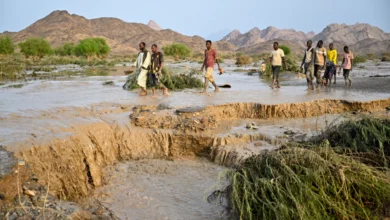Local press coverage of Egypt’s decisive World Cup qualifying match with Algeria on Wednesday night — which ended in a victory for the latter — focused largely on clashes between rival fans and resultant injuries on both sides.
Instead of discussing the Egyptian team’s mediocre performance on the field, official daily Al-Akhbar ran statements on its front page made by Algerian Prime Minister Ahmed Ouyahia in which he vouched for the safety of Egyptian expatriates resident in Algeria. Ouyahia was quoted as saying that security would be stepped-up around Egyptian interests in Algeria.
Following an earlier Egypt-Algeria showdown on Saturday — which Egypt handily won 2-0 — the Egyptian embassy in Algiers, along with offices belonging to Egyptian telecommunications giant Orascom Telecom, were pelted with stones by outraged Algerian football fans. National carrier EgyptAir’s Algeria offices, meanwhile, were reportedly sabotaged.
Satellite sports channels broadcasting from Egypt, along with popular Egyptian talk shows, received frantic phone calls from Egyptians living abroad claiming they had been victims of Algerian post-match bullying. One caller said that a residential compound in Algeria housing Egyptian expats had been attacked with petrol bombs. "We’re dying here," the caller shouted, claiming that his pleas for help were being ignored by both Egyptian and Algerian authorities.
Following Wednesday night’s decisive game, some Egyptian fans — in Sudan to watch the match — claimed they had been "abandoned" to face the wrath of Algerian football hooligans.
Singer Haitham Shaker told the Nile Sports channel that he and other Egyptians had received "rough treatment" at the hands of Algerians. He claimed that he and several others were hiding out in a building from armed hooligans and that Egyptian officials were not responding to their calls. The singer sounded shaken, saying they were "all alone."
Lapses by Egypt’s Foreign Ministry, however, were not highlighted by official national broadsheets Al-Ahram and Al-Akhbar. The Wednesday edition of the latter reported that Safwat Sherif, secretary-general of the ruling National Democratic Party (NDP), along with presidential scion Gamal Mubarak, were personally looking into how the NDP could better support the national team.
Other first-edition reports, likely written before the match, predicted victory for the Egyptian team. Some experts were quoted as saying that the team’s "balanced performance, tight frontline, and organized offence tip the scales in favor of Egypt."
On page 20, Al-Akhbar carried small reports quoting Sudanese and Algerian officials who vouched for the safety of Egyptian football fans — statements which, in the context of the Sudan match’s violent aftermath, rang hollow.
Only hours after Egypt’s defeat, Al-Ahram’s midnight edition was released with the headline: "Public hopes for Egypt’s qualifying for World Cup." Some readers laughed off the mistake, while others were unappreciative of the irony — after all, the enthusiastic headline came just as Egyptians began mourning the defeat on blogs and websites.
The above-mentioned Al-Ahram report from Sudanese capital Khartoum also included ill-timed predictions of victory by Egyptian football officials. Foreign Ministry spokesman Hossam Zaki, meanwhile, was quoted as saying that he was in contact with Algerian authorities to guarantee expat Egyptians’ safety.
In the paper’s second morning edition, however, the match — and its violent consequences — took a backseat to a speech delivered by President Hosni Mubarak at an international food security conference in Rome. The final score from the match was not mentioned, while officials appeared nonplussed by the defeat.




